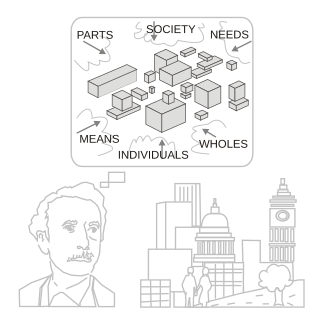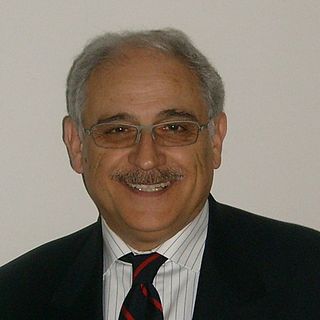
Systems theory is the interdisciplinary study of systems. A system is a cohesive conglomeration of interrelated and interdependent parts that is either natural or man-made. Every system is delineated by its spatial and temporal boundaries, surrounded and influenced by its environment, described by its structure and purpose or nature and expressed in its functioning. In terms of its effects, a system can be more than the sum of its parts if it expresses synergy or emergent behavior. Changing one part of the system usually affects other parts and the whole system, with predictable patterns of behavior. For systems that are self-learning and self-adapting, the positive growth and adaptation depend upon how well the system is adjusted with its environment. Some systems function mainly to support other systems by aiding in the maintenance of the other system to prevent failure. The goal of systems theory is systematically discovering a system's dynamics, constraints, conditions and elucidating principles that can be discerned and applied to systems at every level of nesting, and in every field for achieving optimized equifinality.

Social constructionism is a theory of knowledge in sociology and communication theory that examines the development of jointly constructed understandings of the world that form the basis for shared assumptions about reality. The theory centers on the notion that meanings are developed in coordination with others rather than separately within each individual.

Systems science is an interdisciplinary field that studies the nature of systems—from simple to complex—in nature, society, cognition, engineering, technology and science itself. To systems scientists, the world can be understood as a system of systems. The field aims to develop interdisciplinary foundations that are applicable in a variety of areas, such as psychology, biology, medicine, communication, business management, engineering, and social sciences.
In sociology, social complexity is a conceptual framework used in the analysis of society. Contemporary definitions of complexity in the sciences are found in relation to systems theory, in which a phenomenon under study has many parts and many possible arrangements of the relationships between those parts. At the same time, what is complex and what is simple is relative and may change with time.
Organizational behavior (OB) or organisational behaviour is "the study of human behavior in organizational settings, the interface between human behavior and the organization, and the organization itself". OB research can be categorized in at least three ways, including the study of:
Complexity theory and organizations, also called complexity strategy or complex adaptive organizations, is the use of the study of complexity systems in the field of strategic management and organizational studies.
Sensemaking or sense-making is the process by which people give meaning to their collective experiences. It has been defined as "the ongoing retrospective development of plausible images that rationalize what people are doing". The concept was introduced to organizational studies by Karl E. Weick in the 1970s and has affected both theory and practice. Weick intended to encourage a shift away from the traditional focus of organization theorists on decision-making and towards the processes that constitute the meaning of the decisions that are enacted in behavior.
A network-centric organization is a network governance pattern emerging in many progressive 21st century enterprises. This implies new ways of working, with consequences for the enterprise’s infrastructure, processes, people and culture.

Stuart Anspach Umpleby is an American cybernetician and professor in the Department of Management and Director of the Research Program in Social and Organizational Learning in the School of Business at the George Washington University.
Business agility refers to the "ability of a business system to rapidly respond to change by adapting its initial stable configuration". It can be sustained by maintaining and adapting goods and services in meeting customer demands, adjusting to the changes in a business environment, and taking advantage of available human resources.

John Pourdehnad is an American organizational theorist, and consultant. He is associate director of the Ackoff Center for Advancement of Systems Approaches (ACASA), and Affiliated Faculty in the Organizational Dynamics Graduate Program at the University of Pennsylvania.
Innovation management is a combination of the management of innovation processes, and change management. It refers to product, business process, and organizational innovation. Innovation management is the subject of ISO 50500 series standards developed by ISO TC 279.
Kristo Ivanov is a Swedish-Brazilian information scientist and systems scientist of ethnic Bulgarian origin. He is professor emeritus at the Department of informatics of Umeå University in Sweden.
Yi Lin, also known as Jeffrey Forrest and Jeffrey Yi-Lin Forrest, is a professor of mathematics, systems science, economics, and finance at Pennsylvania State System of Higher Education (SSHE) and at several major universities in China. Lin has been an active researcher in the field of systems science since mid-1980s and serves as the founder and president of the International Institute for General Systems Studies (IIGSS).
A social-ecological system consists of 'a bio-geo-physical' unit and its associated social actors and institutions. Social-ecological systems are complex and adaptive and delimited by spatial or functional boundaries surrounding particular ecosystems and their context problems.
The viable systems approach (VSA) is a systems theory in which the observed entities and their environment are interpreted through a systemic viewpoint, starting with the analysis of fundamental elements and finally considering more complex related systems. The assumption is that each entity/system is related to other systems, placed at higher level of observation, called supra-systems, whose traits can be detected in their own subsystems.
Linda Smircich is a Professor of Management in the Isenberg School of Management, University of Massachusetts Amherst where she teaches Organizational Alternative Paradigms. She is part of the critical management studies approach field and a critical researcher in organizational culture and gender.
John Hassard is a British social scientist specialising in organization theory. He is known for conducting a ‘multiple paradigm’ case study investigation in organizational research.









